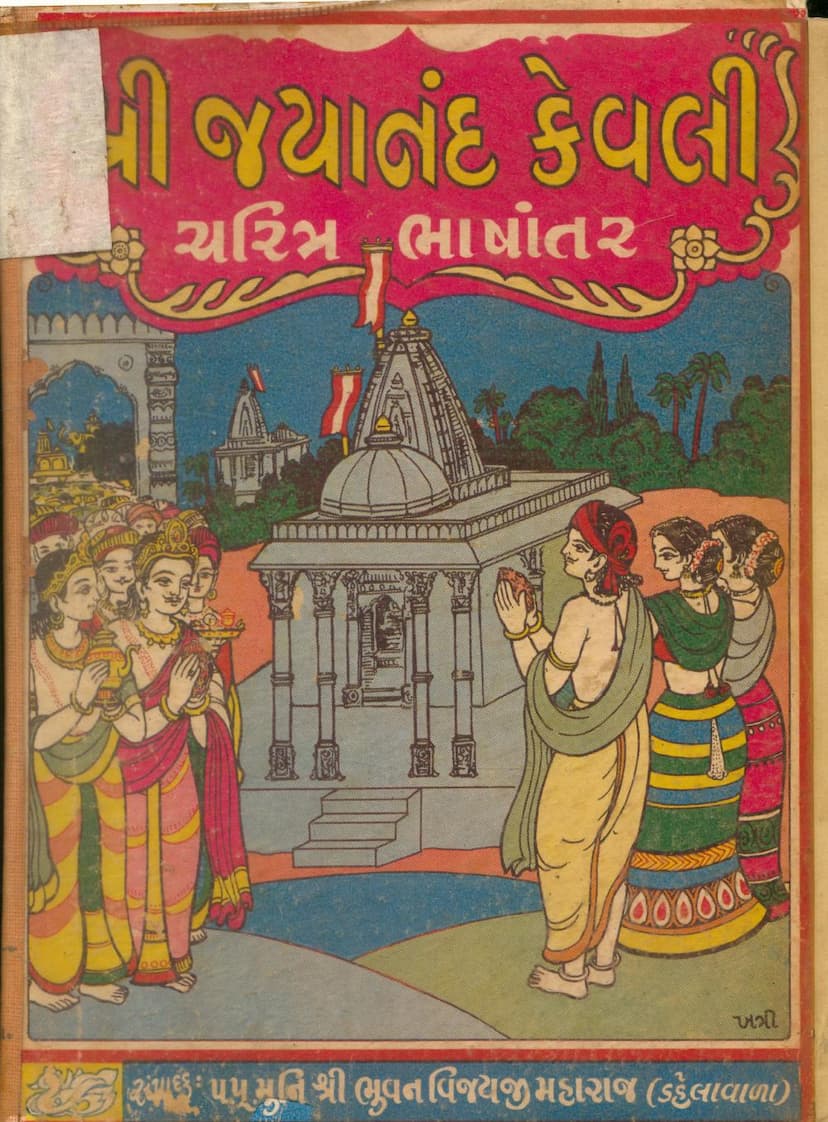Jayanand Kevali Charitra
Added to library: September 2, 2025

Summary
The Jain text "Jayanand Kevali Charitra" by Bhuvanvijay, published by Jain Dharmopkaran Samstha, chronicles the life and spiritual journey of Jayanand Kevali, a prominent figure in Jainism. While the provided text focuses primarily on the introductory and biographical details of the author and the text itself, it also offers glimpses into the philosophical underpinnings and the narrative structure of the biography.
Here's a comprehensive summary based on the provided pages:
Core Theme and Purpose:
The "Jayanand Kevali Charitra" is presented as a spiritual and educational text within the Jain tradition. Its primary purpose is to disseminate religious teachings and moral principles through the life story of Jayanand Kevali, who attained liberation (Kevalgyan and Moksha). The text emphasizes the importance of devotion (Bhakti), virtuous conduct (Aradhana), spiritual development, and the ultimate goal of attaining liberation from the cycle of birth and death.
Author and Tradition:
The author is identified as Bhuvanvijay, a respected figure within the Jain tradition. The text is presented in Gujarati with a translation into English, indicating an effort to reach a wider audience. The publisher, Jain Dharmopkaran Samstha, suggests an organization dedicated to the propagation and preservation of Jain scriptures and artifacts. The text also acknowledges the significant lineage of Jain Acharyas, including Muni Sundarsuri Maharaj (the author of the original work), Devasundarsuri Maharaj, Gnansagarsuri Maharaj, and Somsumdarsuri Maharaj, highlighting a rich tradition of scholarship and spiritual guidance.
Philosophical and Doctrinal Aspects:
The text delves into fundamental Jain philosophical concepts:
- The Nature of Reality: It discusses the Jain perspective on the universe being composed of sentient (Jiv) and non-sentient (Jad) substances. It touches upon the idea that while all beings share the same fundamental characteristics of the soul, their development and progression through life forms (from Nigod to Sangni Panchendriya) are influenced by karma (Karmavaran).
- The Path to Liberation: The core message revolves around achieving spiritual development and liberation. The text highlights that human life (Manav Bhav) is a crucial opportunity for achieving complete development and attaining liberation. It emphasizes the importance of "Aradhana" (devotional practices and virtuous conduct) as the path to progress and "Viradhana" (unvirtuous conduct) as the path to downfall.
- The Significance of Human Life: The text specifically points out that the human form is considered the most conducive for achieving the highest spiritual development and obtaining the means for liberation. Other life forms like celestial beings (Devgati) and hellish beings (Narakgati) or animals (Tirychgati) are depicted as less conducive to spiritual progress due to their specific limitations or circumstances.
- The Role of Knowledge and Perspective: The text introduces the concept of "Samanvay Drishti" (integrative perspective) versus "Pruthakkaran Vibhag Drishti" (analytical or divisive perspective) in understanding the world. It suggests that while analysis can reveal infinite differences, integration is key to understanding the interconnectedness of all things. This relates to the Jain principle of "Anekantavada" (the multi-faceted nature of reality).
- The Importance of Aryavarta: The text highlights the significance of "Arya Bhoomi" (sacred land, particularly India) as an environment that fosters spiritual aspirations and the pursuit of well-being in this life and the next. It mentions the pervasiveness of religious consciousness in Indian culture, from villages to forests, where even in isolated places, people worship the divine and perform acts of merit.
Narrative and Content of Jayanand Kevali Charitra:
The "Jayanand Kevali Charitra" itself is described as a character-based narrative that illustrates these principles. It contains:
- Illustrative Examples: The biography of Jayanand Kevali is used as a primary example of someone who achieved Kevalgyan and attained liberation in the same lifetime.
- Moral Precepts: The charitra (biography) is filled with teachings and examples related to righteous conduct (Sadhu Acharya), right faith (Samyak), vows (Vrat), charity (Dan), ethics (Sheel), austerity (Tap), inner disposition (Bhav), and spiritual development.
- The Story of Jayanand: The narrative of Jayanand Kevali is presented as a central part of the text. It begins with the story of King Jay and his nephew, who, despite their noble upbringing, embark on paths that lead to either spiritual progress (Jayanand) or downfall (Singhsaar), influenced by past life karmas. The initial stages of Jayanand's life are described, including his past births, his devotion, his renunciation, and his journey towards Kevalgyan.
- Key Events and Characters: The narrative seems to involve complex life journeys, including reincarnation, spiritual guidance from Munis, interactions with various celestial and demonic beings, and the eventual attainment of Kevalgyan and Moksha by Jayanand. The text also mentions the role of divine interventions and the consequences of actions.
The Translation and Publication:
The text mentions its publication by Jain Dharmopkaran Samstha and includes details about its value (₹1000). It also indicates a previous publication of a translated version by Bhavnagar Prasarak Sabha in 199. The current translation is attributed to Muni Shri Bhuvanvijayji Maharaj, highlighting his efforts in making this text accessible. The preface is written by Mafatlal Zaverchand Gandhi, who expresses gratitude to Muni Bhuvanvijayji for the opportunity to work on this project.
Overall Impression:
The "Jayanand Kevali Charitra" appears to be a rich and extensive Jain scripture. It aims to educate and inspire readers by illustrating profound spiritual truths through the detailed life story of a significant Jain figure. The emphasis on the human birth as a vital opportunity for spiritual progress and the detailed description of Jayanand's journey underscore the core tenets of the Jain faith.